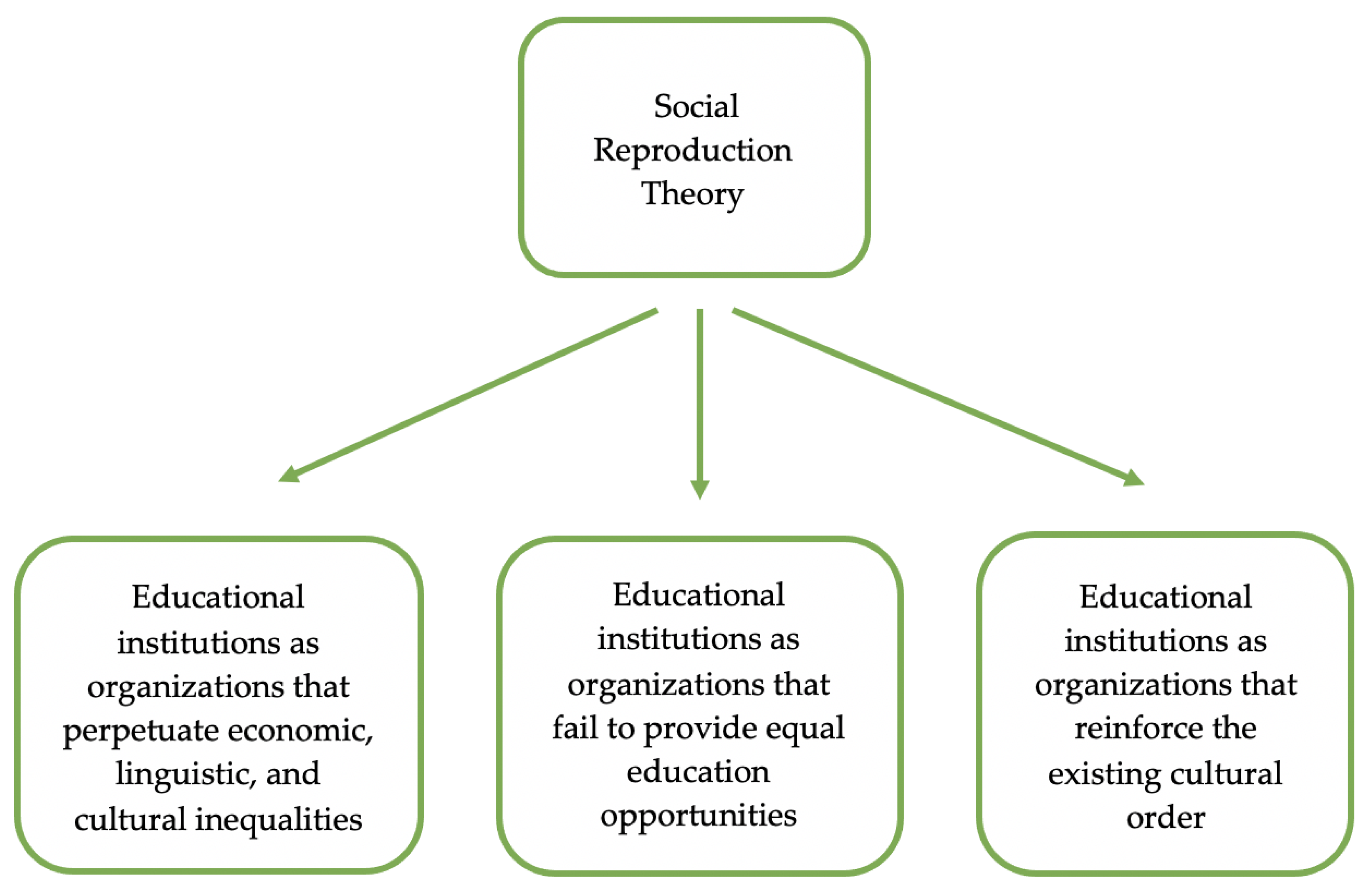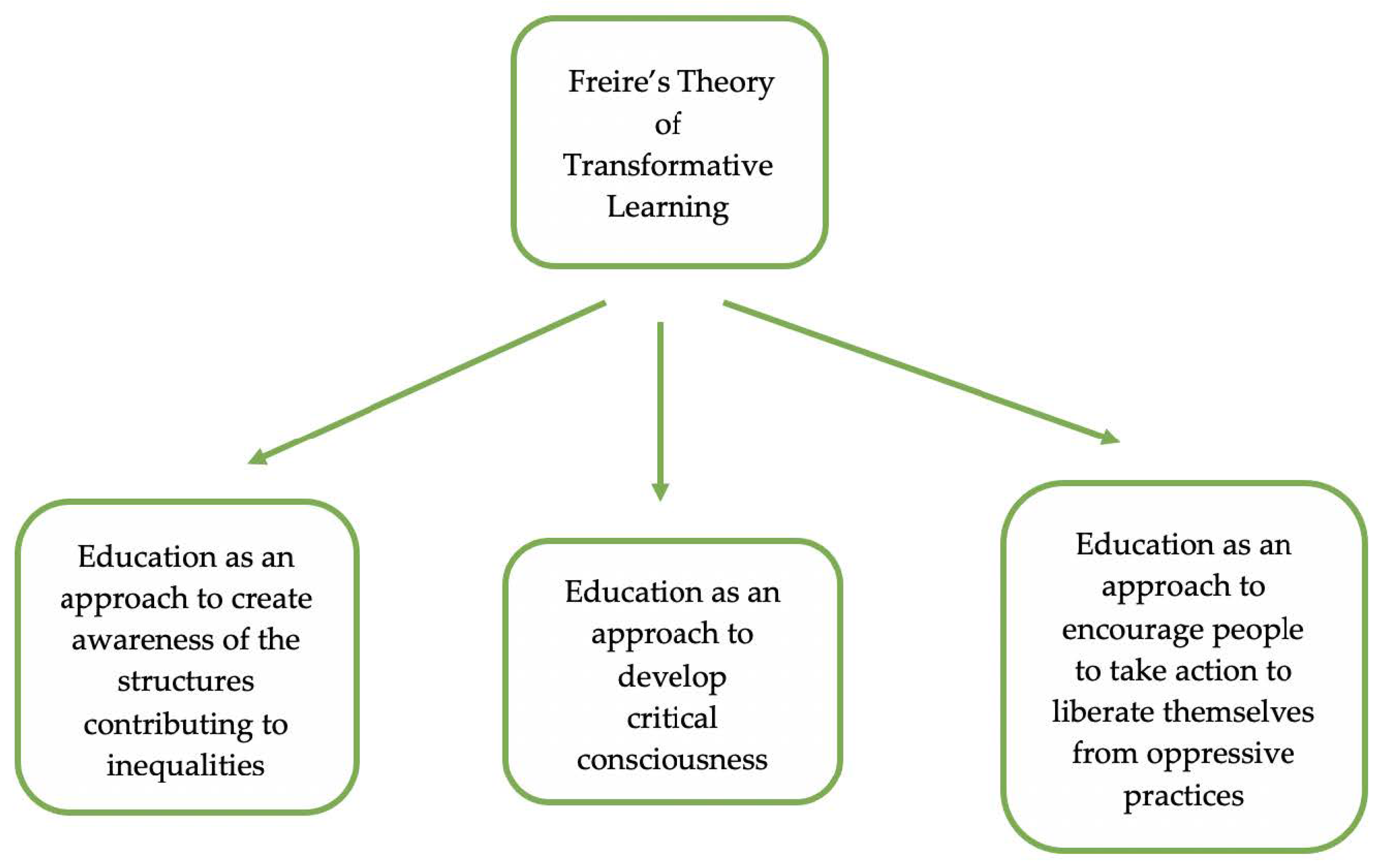Improving Massive Open Online Courses to Reduce the Inequalities Created by Colonialism
Abstract
1. Introduction
Characteristics, Origins, and Types of MOOCs
2. Theoretical Framework
3. Research Method and Research Questions
3.1. Research Questions
- Do MOOCs alleviate or maintain the inequalities caused by colonialism?
- How do MOOCs alleviate or maintain these inequalities?
- How can MOOCs be improved to democratize education?
3.2. Selection and Retrieval of Documents
3.3. Inclusionary and Exclusionary Criteria
3.4. Coding Process
4. Findings and Discussion
4.1. Theme 1: Failing to Meet Students’ Basic Needs
4.2. Theme 2: Ignoring Students’ Language and Culture
4.3. Theme 3: Meeting Students’ Basic Needs
4.4. Theme 4: Respecting Language, Culture, and Knowledge Base
5. Conclusions
Funding
Institutional Review Board Statement
Informed Consent Statement
Data Availability Statement
Conflicts of Interest
References
- Pappano, L. The Boy Genius of Ulan Bator. 2013. Available online: https://www.nytimes.com/2013/09/15/magazine/the-boy-genius-of-ulan-bator.html (accessed on 28 June 2023).
- Bali, M.A.; Sharma, S. Envisioning Post-Colonial MOOCs: Critiques and Ways Forward. In Massive Open Online Courses and Higher Education What Went Right, What Went Wrong and Where to Next? Bennett, R., Kent, M., Eds.; Routledge: New York, NY, USA, 2017; pp. 26–44. [Google Scholar]
- Blakemore, E. What Is Colonialism? 2019. Available online: https://www.nationalgeographic.com/culture/article/colonialism?loggedin=true&rnd=1683747663825 (accessed on 29 June 2023).
- Berinzon, M.; Briggs, R. 60 Years Later, Are Colonial-Era Laws Holding Africa Back? 2017. Available online: https://www.washingtonpost.com/news/monkey-cage/wp/2017/01/20/60-years-later-are-colonial-era-laws-holding-africa-back/ (accessed on 10 May 2023).
- Geopolitical Futures. Colonial Powers in Sub-Saharan Africa. 2016. Available online: https://geopoliticalfutures.com/colonial-powers-in-sub-saharan-africa/ (accessed on 10 May 2023).
- Bartlett, J.; Alcoba, N.; Daniels, J.P.; Cecco, L. Indigenous Americans Demand a Reckoning with Brutal Colonial History. 2021. Available online: https://www.theguardian.com/world/2021/jul/27/indigenous-americans-protesting-brutal-colonial-history (accessed on 10 May 2023).
- Michalopoulos, S.; Papaioannou, E. European Colonialism in Africa Is Alive. 2021. Available online: https://www.project-syndicate.org/onpoint/europe-africa-colonial-era-lasting-effects-by-stelios-michalopoulos-and-elias-papaioannou-2021-07 (accessed on 30 June 2023).
- Fasimpaur, K. Massive and open. Learn. Lead. Technol. 2013, 40, 12–17. [Google Scholar]
- Crosslin, M. Exploring self-regulated learning choices in a customizable learning pathway MOOC. Australas. J. Educ. Technol. 2018, 34, 131–144. [Google Scholar] [CrossRef]
- Adam, T. Digital neocolonialism and massive open online courses (MOOCs): Colonial pasts and neoliberal futures. Learn. Media Technol. 2019, 44, 365–380. [Google Scholar] [CrossRef]
- Bayne, S.; Ross, J. The Pedagogy of the Massive Open Online Course: The UK View. 2014. Available online: https://s3.eu-west-2.amazonaws.com/assets.creode.advancehe-document-manager/documents/hea/private/hea_edinburgh_mooc_web_240314_1_1568036979.pdf (accessed on 30 June 2023).
- Collins, J. Social reproduction in classrooms and schools. Annu. Rev. Anthropol. 2009, 38, 33–48. [Google Scholar] [CrossRef]
- Morgan, H. Neoliberalism’s influence on American universities: How the business model harms students and society. Policy Futures Educ. 2021, 20, 149–165. [Google Scholar] [CrossRef]
- Dirkx, J.M. Transformative learning theory in the practice of adult education: An overview. PAACE J. Lifelong Learn. 1998, 7, 1–14. [Google Scholar]
- Rennick, J.B. Learning that makes a difference: Pedagogy and practice for learning abroad. Teach. Learn. Inq. 2015, 3, 71–88. [Google Scholar] [CrossRef]
- Tracy, S.J. Qualitative quality: Eight ‘‘big-tent’’ criteria for excellent qualitative research. Qual. Inq. 2010, 16, 837–851. [Google Scholar] [CrossRef]
- Patton, M.Q. Qualitative Research and Evaluation Methods; Sage: Thousand Oaks, CA, USA, 2015. [Google Scholar]
- Braun, V.; Clarke, V.; Hayfield, N.; Terry, G. Thematic Analysis. In Handbook of Research Methods in Health Social Sciences; Liamputtong, P., Ed.; Springer: Singapore, 2019; pp. 843–860. [Google Scholar]
- Braun, V.; Clarke, V. Thematic Analysis: A Practical Guide; Sage: Thousand Oaks, CA, USA, 2022. [Google Scholar]
- Merriam, S.B.; Tisdell, E.J. Qualitative Research: A Guide to Design and Implementation, 4th ed.; Jossey Bass: San Francisco, CA, USA, 2016. [Google Scholar]
- The White House. Increasing College Opportunity for Low-Income Students. 2014. Available online: https://obamawhitehouse.archives.gov/sites/default/files/docs/increasing_college_opportunity_for_low-income_students_report.pdf (accessed on 28 June 2023).
- Pappano, L. The Year of the MOOC. 2012. Available online: https://www.nytimes.com/2012/11/04/education/edlife/massive-open-online-courses-are-multiplying-at-a-rapid-pace.html (accessed on 10 May 2023).
- Jaggars, S.S. No, Online Classes Are Not Going to Help America’s Poor Kids Bridge the Achievement Gap. 2015. Available online: https://www.washingtonpost.com/posteverything/wp/2015/04/07/no-online-classes-are-not-going-to-help-americas-poor-kids-bridge-the-achievement-gap/ (accessed on 10 May 2023).
- Hansen, J.D.; Reich, J. Democratizing education? Examining access and usage patterns in massive open online courses. Science 2015, 350, 1245–1248. [Google Scholar] [CrossRef] [PubMed]
- Lederman, D. Why MOOCs Didn’t Work, in 3 Data Points. 2019. Available online: https://www.insidehighered.com/digital-learning/article/2019/01/16/study-offers-data-show-moocs-didnt-achieve-their-goals (accessed on 10 May 2023).
- Reich, J. MOOC Completion and Retention in the Context of Student Intent. 2014. Available online: https://er.educause.edu/articles/2014/12/mooc-completion-and-retention-in-the-context-of-student-intent (accessed on 10 May 2023).
- Webley, K. MOOC Brigade: Can Online Courses Keep Students from Cheating? 2012. Available online: https://nation.time.com/2012/11/19/mooc-brigade-can-online-courses-keep-students-from-cheating/ (accessed on 10 May 2023).
- International Consultants for Education and Fairs. MOOC Enrolment Surpassed 35 Million in 2015. 2016. Available online: https://monitor.icef.com/2016/01/mooc-enrolment-surpassed-35-million-in-2015/ (accessed on 29 June 2023).
- Agudo, R.R. The Language of MOOCs. 2019. Available online: https://www.insidehighered.com/digital-learning/views/2019/01/09/moocs-overwhelming-dependence-english-limits-their-impact-opinion (accessed on 10 May 2023).
- Sayedayn, S. Language & colonization: Statement of the problem. J. Sch. Soc. 2021, 7, 134–138. [Google Scholar]
- Barone, F. Language, Culture & Society. 2020. Available online: https://hraf.yale.edu/teach-ehraf/language-culture-society/ (accessed on 10 May 2023).
- Tisby, J. What Columbus Really Thought about Native Americans. 2018. Available online: https://thewitnessbcc.com/columbus-and-his-fellow-europeans-imported-their-ideas-of-racial-superiority-into-relationships-with-native-americans/ (accessed on 10 May 2023).
- Reuters. Last Known Speaker Fights to Preserve South African Indigenous Language. 2023. Available online: https://www.reuters.com/world/africa/last-known-speaker-fights-preserve-south-african-indigenous-language-2023-05-11/ (accessed on 29 June 2023).
- Kurt, S. The case of Turkish university students and MOOCs. Am. J. Distance Educ. 2019, 33, 120–131. [Google Scholar] [CrossRef]
- Lambert, S.R. Do MOOCs contribute to student equity and social inclusion? A systematic review 2014–18. Comput. Educ. 2020, 145, 103693. [Google Scholar] [CrossRef]
- Lefkowitz, M. Study: No Single Solution Helps All Students Complete MOOCs. 2020. Available online: https://news.cornell.edu/stories/2020/06/study-no-single-solution-helps-all-students-complete-moocs (accessed on 29 June 2023).
- Ma, L.; Lee, C.S. Leveraging MOOCs for Learners in Economically Disadvantaged Regions. 2023. Available online: https://link.springer.com/article/10.1007/s10639-022-11461-2 (accessed on 10 May 2023).
- UNESCO. Making Sense of MOOCs: A Guide for Policy-Makers in Developing Countries. 2016. Available online: https://unesdoc.unesco.org/ark:/48223/pf0000245122 (accessed on 10 May 2023).
- Altbach, P.G. MOOCs as neocolonialism: Who controls knowledge? Int. High. Educ. 2014, 75, 5–7. [Google Scholar] [CrossRef]


Disclaimer/Publisher’s Note: The statements, opinions and data contained in all publications are solely those of the individual author(s) and contributor(s) and not of MDPI and/or the editor(s). MDPI and/or the editor(s) disclaim responsibility for any injury to people or property resulting from any ideas, methods, instructions or products referred to in the content. |
© 2023 by the author. Licensee MDPI, Basel, Switzerland. This article is an open access article distributed under the terms and conditions of the Creative Commons Attribution (CC BY) license (https://creativecommons.org/licenses/by/4.0/).
Share and Cite
Morgan, H. Improving Massive Open Online Courses to Reduce the Inequalities Created by Colonialism. Educ. Sci. 2023, 13, 772. https://doi.org/10.3390/educsci13080772
Morgan H. Improving Massive Open Online Courses to Reduce the Inequalities Created by Colonialism. Education Sciences. 2023; 13(8):772. https://doi.org/10.3390/educsci13080772
Chicago/Turabian StyleMorgan, Hani. 2023. "Improving Massive Open Online Courses to Reduce the Inequalities Created by Colonialism" Education Sciences 13, no. 8: 772. https://doi.org/10.3390/educsci13080772
APA StyleMorgan, H. (2023). Improving Massive Open Online Courses to Reduce the Inequalities Created by Colonialism. Education Sciences, 13(8), 772. https://doi.org/10.3390/educsci13080772









